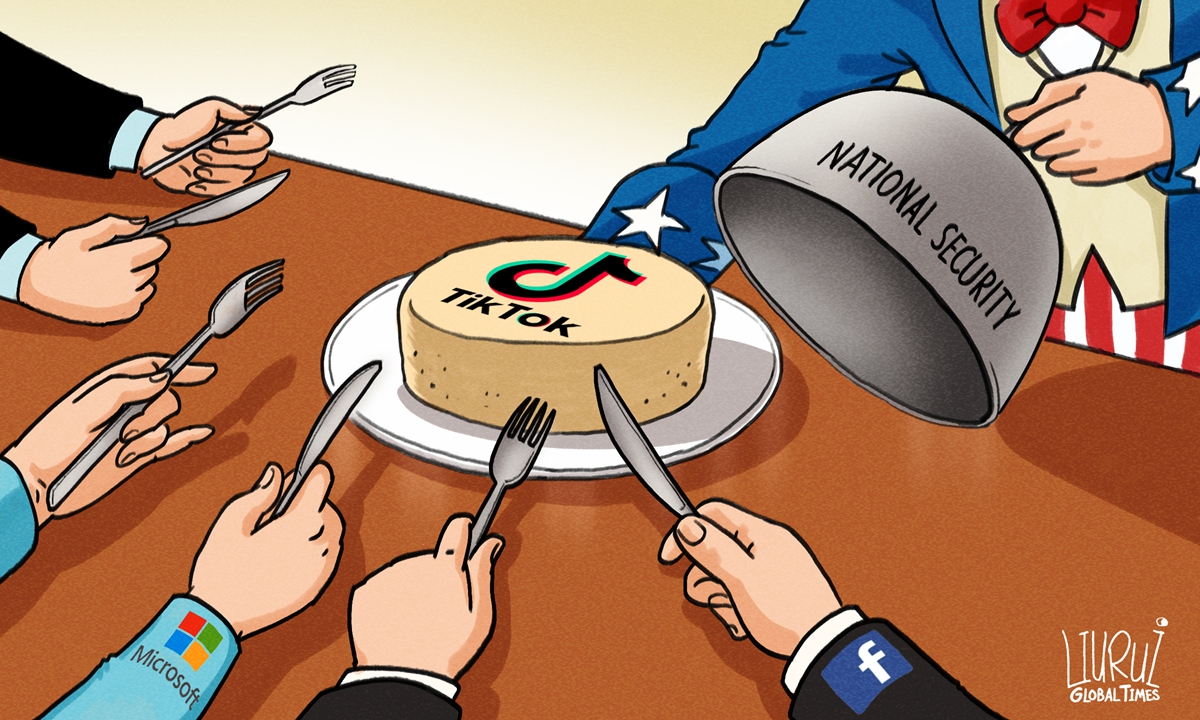TikTok’s ‘sin’ is challenging US tech giants for free-flow of ideas
By Hu Xijin Source: Global Times Published: 2020/8/2 23:02:06

Illustration: Liu Rui/GT
TikTok has two "sins."
First, it has challenged the US' high-tech hegemony. Just think about it. Facebook desperately wants to "kill" TikTok, or hopes that it can create a copycat app that is more attractive than TikTok for young people. But it just can't. In many markets around the world, Facebook is feeling huge pressure from TikTok. Everyone can see how Facebook's CEO Mark Zuckerberg has madly smeared TikTok.
Second, TikTok has brought many US teenagers together. Most of them do not like US President Donald Trump. In June, hundreds of teenage TikTok users reserved tickets for Trump's campaign rally in Tulsa, Oklahoma, but they never showed up. It is conceivable that Trump is worried these young people could attack him more seriously before the November presidential election.
If Microsoft acquires TikTok, US elites' concerns about TikTok's challenge to US technological hegemony can be temporarily alleviated. But Trump just wants to kill TikTok once and for all.
In the past, people only saw China allegedly blocking US internet websites and apps. Many people believed China was not open enough. But people really never anticipated that the US would ban Chinese apps today. This has subverted many people's previous understandings and impressions of information security on the internet.
Thinking about it more carefully, people will realize that China did not ban US websites or apps. China simply required them to abide by Chinese laws when operating in China. However, they rejected this and the two sides failed to reach an agreement. These US websites and apps gave up the right to enter the Chinese market themselves.
TikTok, however, has fully abided by US laws during its operations in the country. It does what the US tells it to do. But the US government still plans to ban TikTok, or at least separate it from its parent company Bytedance, thereby allowing a US company to acquire it and turn it into a US company. The US approach is way much tougher than that of China.
The TikTok incident marks a serious inconsistency in traditional American values. If TikTok is eventually banned in the US, it can almost be seen as a disillusionment of the American spirit of freedom and democracy. In particular, it will profoundly affect the US teenagers' worldview.
The US is banning Huawei and TikTok. As China continues to develop, will there be major changes in the pattern of which country is more open, and which is more conservative?
In the end, I want to say that no matter what the result turns out to be, Chinese people should not blame the Bytedance team and its CEO Zhang Yiming. They have already faced many difficulties. In this world full of uncertainties, they are explorers and pioneers. As a company, Bytedance is not obliged to make decisions according to national interest. It can indirectly promote national development and prosperity by strengthening itself. We should allow it to not be deeply involved in disputes over national interests. It should first survive and develop itself. Such values should be placed above the bottom line of business ethics.
We cannot ask all Chinese companies to be heroes that defend the national interest. In fact, Bytedance is already quite outstanding. Even trapped in the current quagmire, Bytedance has shown the world the US high-tech giant's ugly face of hunting a Chinese company and plundering its achievements. It has also shown people how hypocritical the US is by advocating the absolute free flow of information.
The author is editor-in-chief of the Global Times. opinion@globaltimes.com.cn
Posted in: OBSERVER